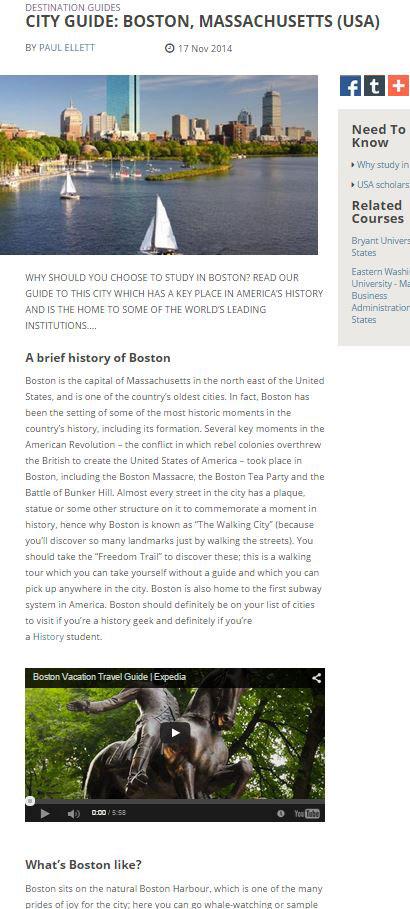
So you’ve decided that you want to study abroad. But you don’t know where to start – you might not even know where or what you want to study!
Don’t worry, Hotcourses Abroad is your one-stop shop for everything study abroad related. Let us show you how we can help you through each stage of your journey, from research through to applying & getting ready, and then student life in another country....
1. First of all, who are we?
2. Decide where and what you want to study overseas
How? Read our guides
We have loads of articles to help you decide the basics about your study abroad adventure. These can help you choose where in the world you want to study and what subject you want to study. As well as both introductory and in-depth guides to courses and study destinations, we also have Q&As with university staff, professors, students and other relevant individuals on a range of topics covering each stage of the study abroad journey.

We also have articles and guides which cover visas, finances, accommodation, student life and careers. Use the search on the article page to find relevant articles for topics you need help with.
Start following us on social media so you never miss an article:
3. Search for a course overseas you’re eligible for
How? Use Ultimate Search (Search from our homepage, or from the floating header at the top of each page throughout the site)
So you know roughly what you want to study...but how to find a course which matches what you're looking for? Our site’s Ultimate Search will find courses based on your search criteria. This is a brand new search which you can’t find anywhere else online! We have entry requirement data for nearly 1000 institutions over 10 destinations; we also have data for 1,200 local language qualifications from 55 countries. What does this mean? Simply, you can match the qualification you currently have in your country to find what out what you’re eligible to study overseas at that moment.
You can also refine your search according to the following:
- where you want to study in a particular country;
- budget for annual tuition fees;
- current or predicted English language level;
- preferred length of study;
- study mode and more.
Once you’ve submitted your search, you’ll be presented with institutions which offer courses that match these preferences. You can read more information about both them and the courses they offer.
Take a look at our guide to using Ultimate Search or watch our video demo below:
4. Make the next step
Once you’ve found a course you’re interested in, you can do one of several actions:
Download a prospectus
How? Click the ‘Download prospectus’ button
Download the official university prospectus from that institution straight to your computer, laptop, mobile or tablet – this way, you can read it anywhere, anytime (whether you have access to WiFi or not). For instance, browse prospectuses while you’re travelling to school!
Ask a question
How? Click the ‘Contact institution’ button
Send a message directly to an institution with any questions you have about applying to or studying there. Your question could be about anything, big or small! And if you don’t know what to ask, read our guide to questions you should be asking to give you some ideas.
Visit the university’s website
How? Click the ‘Visit website’ button
University websites can be difficult to navigate. There’s so much content on these sites for different individuals and for various purposes; so it can be confusing to find what you’re looking for, quickly. On Hotcourses Abroad, you can click through to where you need to be to learn more.
5. See what others think
What do other students have to say?
So you’re happy with everything you’ve read about an institution so far....but what do current international students and alumni have to say about their time there? A lot of what you read about an institution might have been produced by the institution themselves; so getting a firsthand student opinion is far more useful and unbiased. Student reviews are available on each institution’s profile on Hotcourses Abroad. You can see how international students rate their university in key areas such as Funding & Scholarships and Study Experience. Plus you can read uncensored comments from students which give some personal insight into their experience so far.
Where does that institution rank?
How? Browse world university rankings
Browse the most recent editions of globally-respected world university rankings to see where an institution has ranked. Have they slipped a few places or are they growing leaps and bounds? This can be very useful when comparing two similar universities which you’re stuck between. We publicise the Times Higher Education World University Rankings and Times Good University Rankings for UK universities each year.
6. Find financial aid
Need some financial assistance to study abroad? Whether you need a full scholarship to cover your tuition fees in full, or you just want to see whether you’re eligible for extra funds to take the stress off your finances, we can help.
Go to our scholarships page and search for a course overseas. Once you’ve found a course you’re interested in, we’ll suggest scholarships which are tied to that course. You can read about the value of this scholarship and the requirements to apply.
You might even like to ask the institution about scholarship or funding opportunities they offer, though you should do this the correct way.










 Speak to an expert
Speak to an expert
 Chat with Couru
Chat with Couru